Report on Functional Areas and Skills Needed at IOM Electronics Ltd
VerifiedAdded on 2023/06/18
|7
|2094
|475
Report
AI Summary
This report provides an overview of functional areas within a business context, using IOM Electronics Ltd as a case study. It defines functional areas such as marketing, human resource management, customer service, finance, research and development, and sales, highlighting their importance in achieving business objectives. The report details the skills required for employees to perform effectively in each functional area, including communication, analytical thinking, problem-solving, and creativity. It emphasizes the significance of aligning employee skills with departmental needs to enhance productivity and overall business success. The document is available on Desklib, a platform offering a wide range of study resources, including past papers and solved assignments for students.

World of Work
Paraphrase This Document
Need a fresh take? Get an instant paraphrase of this document with our AI Paraphraser
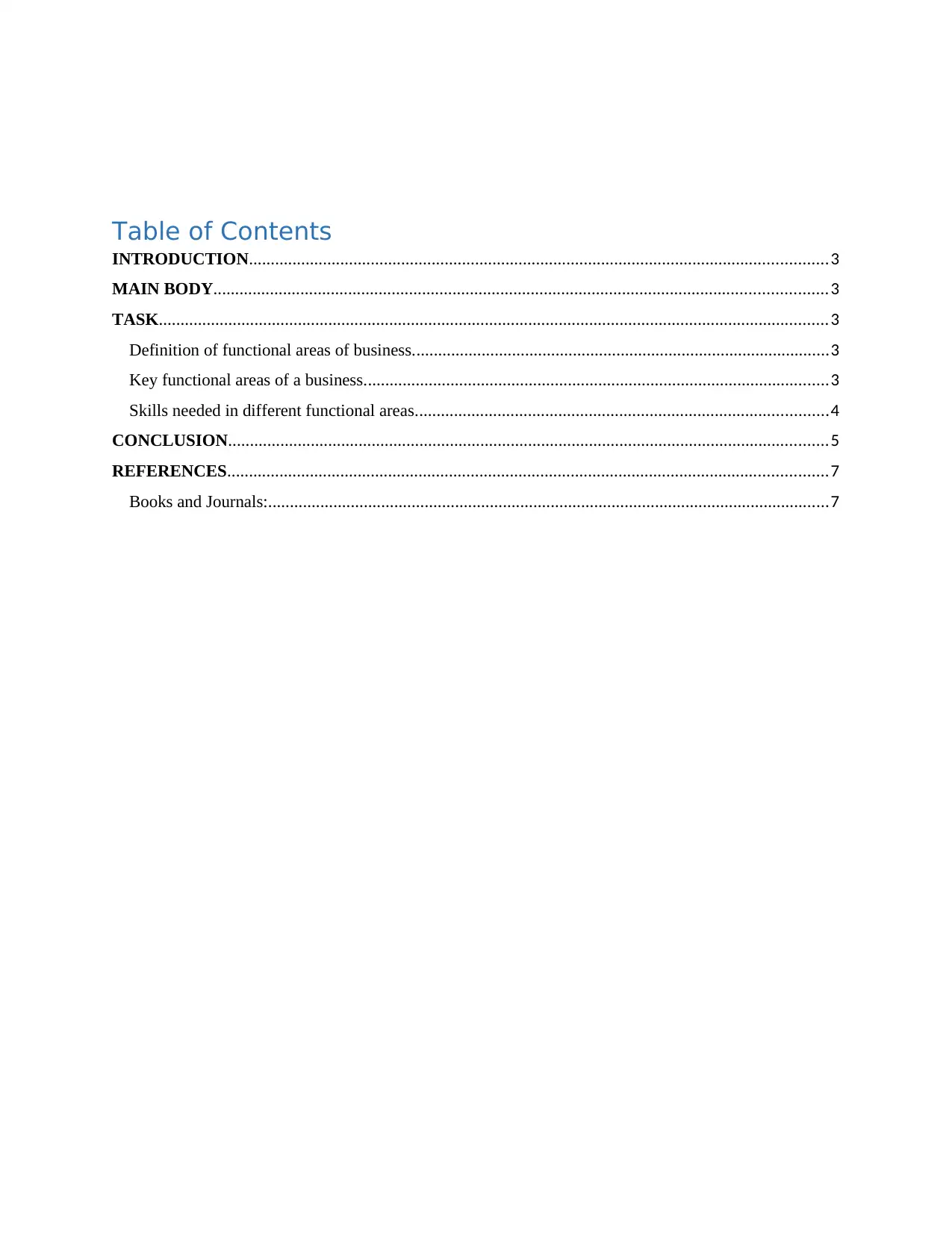
Table of Contents
INTRODUCTION.....................................................................................................................................3
MAIN BODY.............................................................................................................................................3
TASK..........................................................................................................................................................3
Definition of functional areas of business................................................................................................3
Key functional areas of a business...........................................................................................................3
Skills needed in different functional areas...............................................................................................4
CONCLUSION..........................................................................................................................................5
REFERENCES..........................................................................................................................................7
Books and Journals:.................................................................................................................................7
INTRODUCTION.....................................................................................................................................3
MAIN BODY.............................................................................................................................................3
TASK..........................................................................................................................................................3
Definition of functional areas of business................................................................................................3
Key functional areas of a business...........................................................................................................3
Skills needed in different functional areas...............................................................................................4
CONCLUSION..........................................................................................................................................5
REFERENCES..........................................................................................................................................7
Books and Journals:.................................................................................................................................7
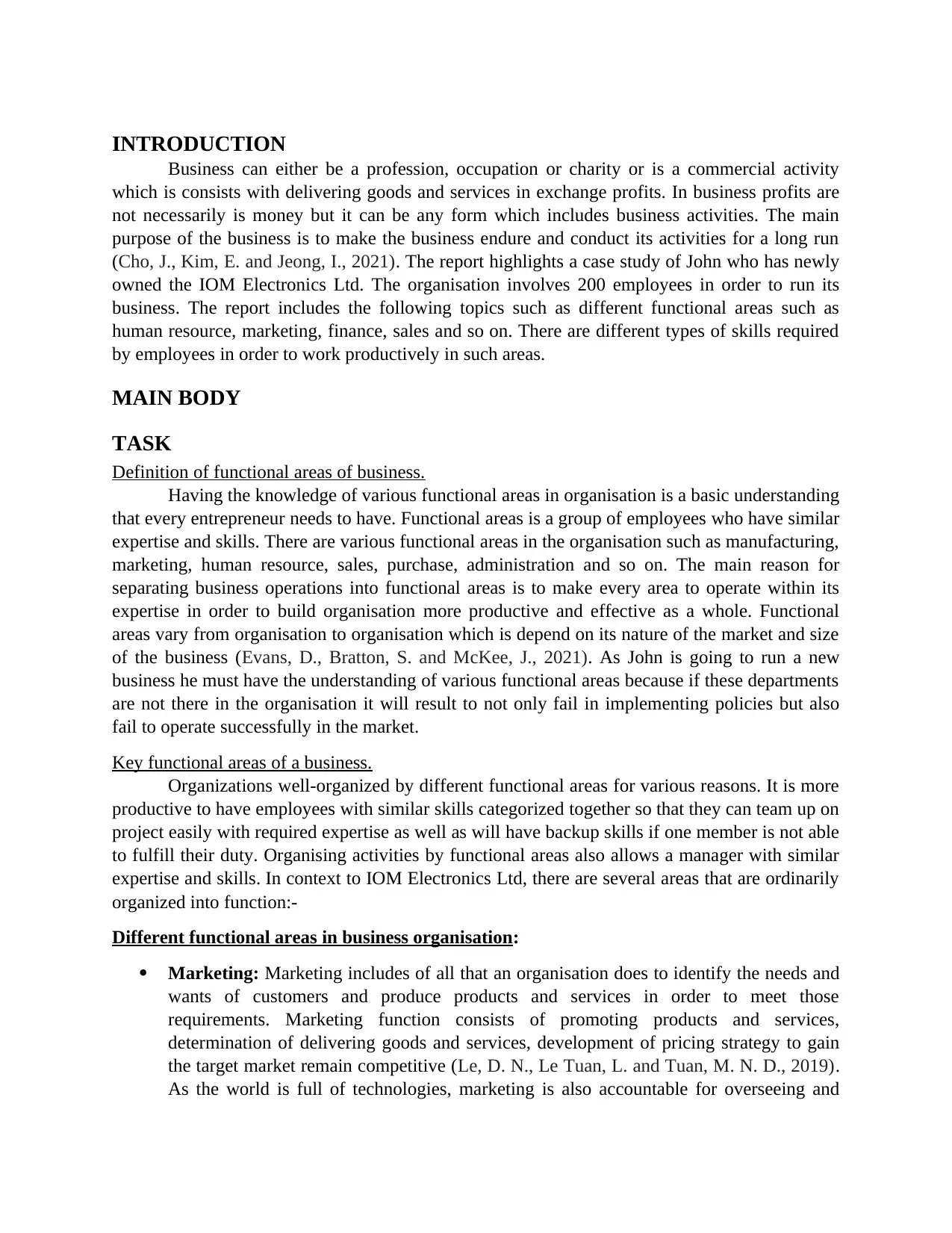
INTRODUCTION
Business can either be a profession, occupation or charity or is a commercial activity
which is consists with delivering goods and services in exchange profits. In business profits are
not necessarily is money but it can be any form which includes business activities. The main
purpose of the business is to make the business endure and conduct its activities for a long run
(Cho, J., Kim, E. and Jeong, I., 2021). The report highlights a case study of John who has newly
owned the IOM Electronics Ltd. The organisation involves 200 employees in order to run its
business. The report includes the following topics such as different functional areas such as
human resource, marketing, finance, sales and so on. There are different types of skills required
by employees in order to work productively in such areas.
MAIN BODY
TASK
Definition of functional areas of business.
Having the knowledge of various functional areas in organisation is a basic understanding
that every entrepreneur needs to have. Functional areas is a group of employees who have similar
expertise and skills. There are various functional areas in the organisation such as manufacturing,
marketing, human resource, sales, purchase, administration and so on. The main reason for
separating business operations into functional areas is to make every area to operate within its
expertise in order to build organisation more productive and effective as a whole. Functional
areas vary from organisation to organisation which is depend on its nature of the market and size
of the business (Evans, D., Bratton, S. and McKee, J., 2021). As John is going to run a new
business he must have the understanding of various functional areas because if these departments
are not there in the organisation it will result to not only fail in implementing policies but also
fail to operate successfully in the market.
Key functional areas of a business.
Organizations well-organized by different functional areas for various reasons. It is more
productive to have employees with similar skills categorized together so that they can team up on
project easily with required expertise as well as will have backup skills if one member is not able
to fulfill their duty. Organising activities by functional areas also allows a manager with similar
expertise and skills. In context to IOM Electronics Ltd, there are several areas that are ordinarily
organized into function:-
Different functional areas in business organisation:
Marketing: Marketing includes of all that an organisation does to identify the needs and
wants of customers and produce products and services in order to meet those
requirements. Marketing function consists of promoting products and services,
determination of delivering goods and services, development of pricing strategy to gain
the target market remain competitive (Le, D. N., Le Tuan, L. and Tuan, M. N. D., 2019).
As the world is full of technologies, marketing is also accountable for overseeing and
Business can either be a profession, occupation or charity or is a commercial activity
which is consists with delivering goods and services in exchange profits. In business profits are
not necessarily is money but it can be any form which includes business activities. The main
purpose of the business is to make the business endure and conduct its activities for a long run
(Cho, J., Kim, E. and Jeong, I., 2021). The report highlights a case study of John who has newly
owned the IOM Electronics Ltd. The organisation involves 200 employees in order to run its
business. The report includes the following topics such as different functional areas such as
human resource, marketing, finance, sales and so on. There are different types of skills required
by employees in order to work productively in such areas.
MAIN BODY
TASK
Definition of functional areas of business.
Having the knowledge of various functional areas in organisation is a basic understanding
that every entrepreneur needs to have. Functional areas is a group of employees who have similar
expertise and skills. There are various functional areas in the organisation such as manufacturing,
marketing, human resource, sales, purchase, administration and so on. The main reason for
separating business operations into functional areas is to make every area to operate within its
expertise in order to build organisation more productive and effective as a whole. Functional
areas vary from organisation to organisation which is depend on its nature of the market and size
of the business (Evans, D., Bratton, S. and McKee, J., 2021). As John is going to run a new
business he must have the understanding of various functional areas because if these departments
are not there in the organisation it will result to not only fail in implementing policies but also
fail to operate successfully in the market.
Key functional areas of a business.
Organizations well-organized by different functional areas for various reasons. It is more
productive to have employees with similar skills categorized together so that they can team up on
project easily with required expertise as well as will have backup skills if one member is not able
to fulfill their duty. Organising activities by functional areas also allows a manager with similar
expertise and skills. In context to IOM Electronics Ltd, there are several areas that are ordinarily
organized into function:-
Different functional areas in business organisation:
Marketing: Marketing includes of all that an organisation does to identify the needs and
wants of customers and produce products and services in order to meet those
requirements. Marketing function consists of promoting products and services,
determination of delivering goods and services, development of pricing strategy to gain
the target market remain competitive (Le, D. N., Le Tuan, L. and Tuan, M. N. D., 2019).
As the world is full of technologies, marketing is also accountable for overseeing and
⊘ This is a preview!⊘
Do you want full access?
Subscribe today to unlock all pages.

Trusted by 1+ million students worldwide
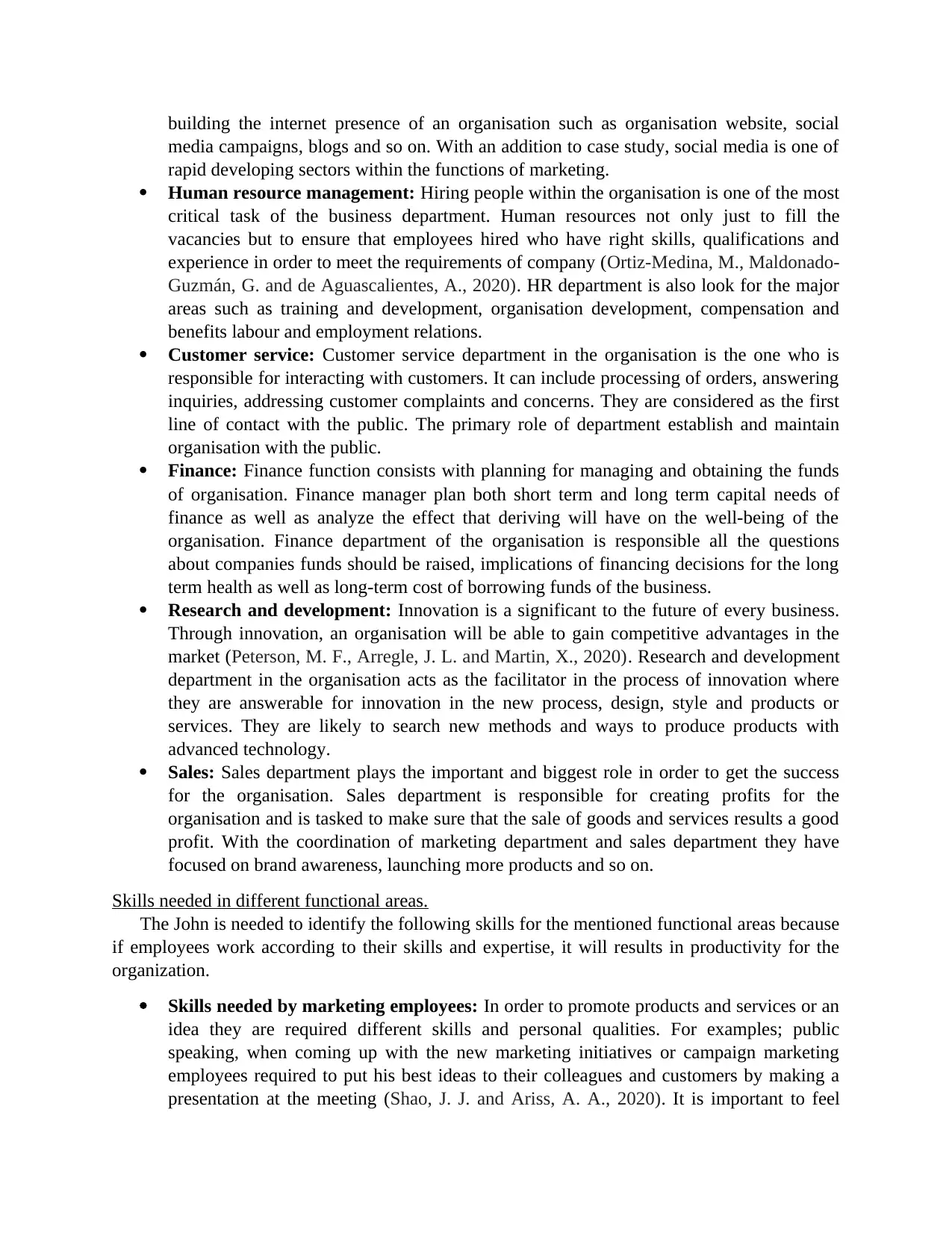
building the internet presence of an organisation such as organisation website, social
media campaigns, blogs and so on. With an addition to case study, social media is one of
rapid developing sectors within the functions of marketing.
Human resource management: Hiring people within the organisation is one of the most
critical task of the business department. Human resources not only just to fill the
vacancies but to ensure that employees hired who have right skills, qualifications and
experience in order to meet the requirements of company (Ortiz-Medina, M., Maldonado-
Guzmán, G. and de Aguascalientes, A., 2020). HR department is also look for the major
areas such as training and development, organisation development, compensation and
benefits labour and employment relations.
Customer service: Customer service department in the organisation is the one who is
responsible for interacting with customers. It can include processing of orders, answering
inquiries, addressing customer complaints and concerns. They are considered as the first
line of contact with the public. The primary role of department establish and maintain
organisation with the public.
Finance: Finance function consists with planning for managing and obtaining the funds
of organisation. Finance manager plan both short term and long term capital needs of
finance as well as analyze the effect that deriving will have on the well-being of the
organisation. Finance department of the organisation is responsible all the questions
about companies funds should be raised, implications of financing decisions for the long
term health as well as long-term cost of borrowing funds of the business.
Research and development: Innovation is a significant to the future of every business.
Through innovation, an organisation will be able to gain competitive advantages in the
market (Peterson, M. F., Arregle, J. L. and Martin, X., 2020). Research and development
department in the organisation acts as the facilitator in the process of innovation where
they are answerable for innovation in the new process, design, style and products or
services. They are likely to search new methods and ways to produce products with
advanced technology.
Sales: Sales department plays the important and biggest role in order to get the success
for the organisation. Sales department is responsible for creating profits for the
organisation and is tasked to make sure that the sale of goods and services results a good
profit. With the coordination of marketing department and sales department they have
focused on brand awareness, launching more products and so on.
Skills needed in different functional areas.
The John is needed to identify the following skills for the mentioned functional areas because
if employees work according to their skills and expertise, it will results in productivity for the
organization.
Skills needed by marketing employees: In order to promote products and services or an
idea they are required different skills and personal qualities. For examples; public
speaking, when coming up with the new marketing initiatives or campaign marketing
employees required to put his best ideas to their colleagues and customers by making a
presentation at the meeting (Shao, J. J. and Ariss, A. A., 2020). It is important to feel
media campaigns, blogs and so on. With an addition to case study, social media is one of
rapid developing sectors within the functions of marketing.
Human resource management: Hiring people within the organisation is one of the most
critical task of the business department. Human resources not only just to fill the
vacancies but to ensure that employees hired who have right skills, qualifications and
experience in order to meet the requirements of company (Ortiz-Medina, M., Maldonado-
Guzmán, G. and de Aguascalientes, A., 2020). HR department is also look for the major
areas such as training and development, organisation development, compensation and
benefits labour and employment relations.
Customer service: Customer service department in the organisation is the one who is
responsible for interacting with customers. It can include processing of orders, answering
inquiries, addressing customer complaints and concerns. They are considered as the first
line of contact with the public. The primary role of department establish and maintain
organisation with the public.
Finance: Finance function consists with planning for managing and obtaining the funds
of organisation. Finance manager plan both short term and long term capital needs of
finance as well as analyze the effect that deriving will have on the well-being of the
organisation. Finance department of the organisation is responsible all the questions
about companies funds should be raised, implications of financing decisions for the long
term health as well as long-term cost of borrowing funds of the business.
Research and development: Innovation is a significant to the future of every business.
Through innovation, an organisation will be able to gain competitive advantages in the
market (Peterson, M. F., Arregle, J. L. and Martin, X., 2020). Research and development
department in the organisation acts as the facilitator in the process of innovation where
they are answerable for innovation in the new process, design, style and products or
services. They are likely to search new methods and ways to produce products with
advanced technology.
Sales: Sales department plays the important and biggest role in order to get the success
for the organisation. Sales department is responsible for creating profits for the
organisation and is tasked to make sure that the sale of goods and services results a good
profit. With the coordination of marketing department and sales department they have
focused on brand awareness, launching more products and so on.
Skills needed in different functional areas.
The John is needed to identify the following skills for the mentioned functional areas because
if employees work according to their skills and expertise, it will results in productivity for the
organization.
Skills needed by marketing employees: In order to promote products and services or an
idea they are required different skills and personal qualities. For examples; public
speaking, when coming up with the new marketing initiatives or campaign marketing
employees required to put his best ideas to their colleagues and customers by making a
presentation at the meeting (Shao, J. J. and Ariss, A. A., 2020). It is important to feel
Paraphrase This Document
Need a fresh take? Get an instant paraphrase of this document with our AI Paraphraser
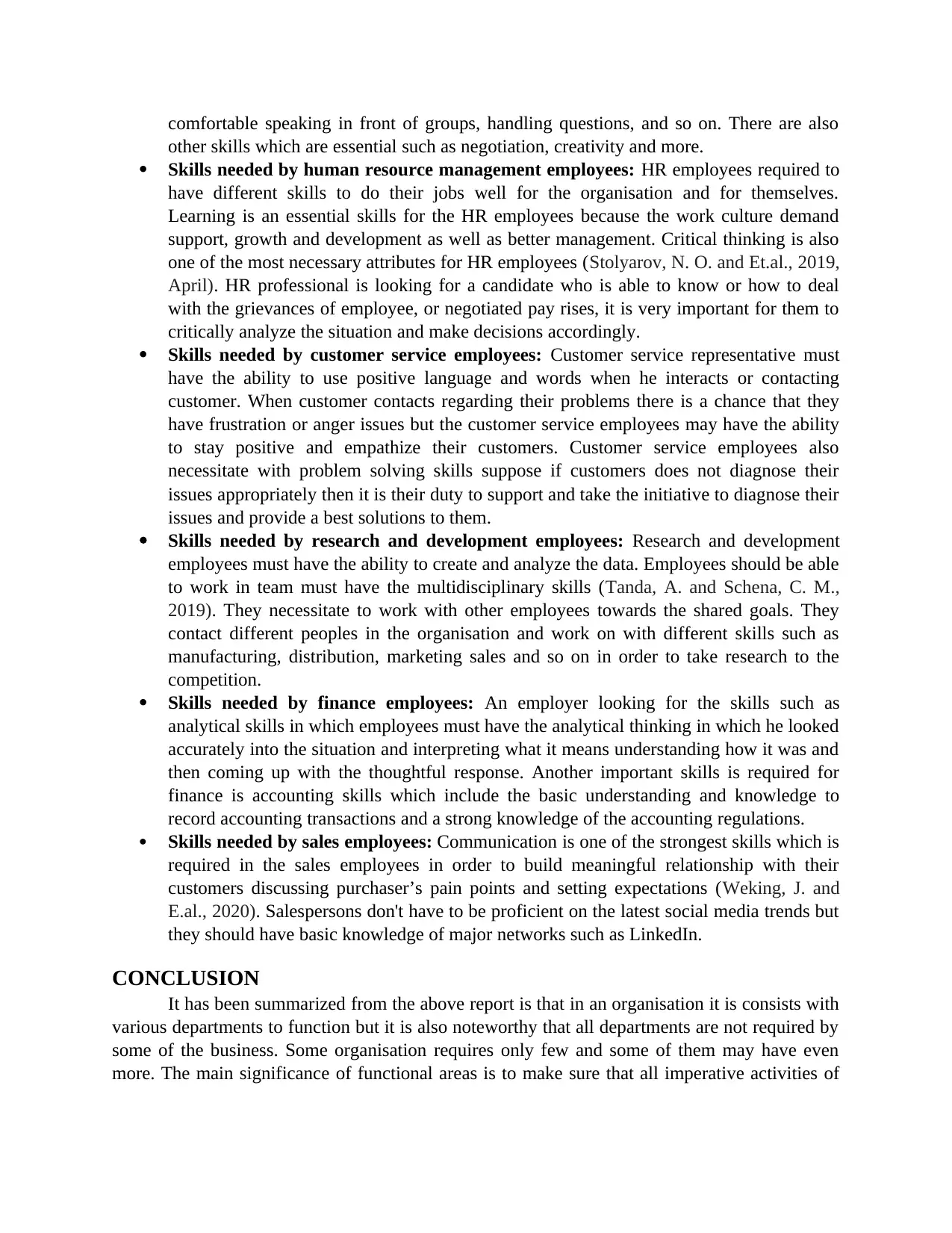
comfortable speaking in front of groups, handling questions, and so on. There are also
other skills which are essential such as negotiation, creativity and more.
Skills needed by human resource management employees: HR employees required to
have different skills to do their jobs well for the organisation and for themselves.
Learning is an essential skills for the HR employees because the work culture demand
support, growth and development as well as better management. Critical thinking is also
one of the most necessary attributes for HR employees (Stolyarov, N. O. and Et.al., 2019,
April). HR professional is looking for a candidate who is able to know or how to deal
with the grievances of employee, or negotiated pay rises, it is very important for them to
critically analyze the situation and make decisions accordingly.
Skills needed by customer service employees: Customer service representative must
have the ability to use positive language and words when he interacts or contacting
customer. When customer contacts regarding their problems there is a chance that they
have frustration or anger issues but the customer service employees may have the ability
to stay positive and empathize their customers. Customer service employees also
necessitate with problem solving skills suppose if customers does not diagnose their
issues appropriately then it is their duty to support and take the initiative to diagnose their
issues and provide a best solutions to them.
Skills needed by research and development employees: Research and development
employees must have the ability to create and analyze the data. Employees should be able
to work in team must have the multidisciplinary skills (Tanda, A. and Schena, C. M.,
2019). They necessitate to work with other employees towards the shared goals. They
contact different peoples in the organisation and work on with different skills such as
manufacturing, distribution, marketing sales and so on in order to take research to the
competition.
Skills needed by finance employees: An employer looking for the skills such as
analytical skills in which employees must have the analytical thinking in which he looked
accurately into the situation and interpreting what it means understanding how it was and
then coming up with the thoughtful response. Another important skills is required for
finance is accounting skills which include the basic understanding and knowledge to
record accounting transactions and a strong knowledge of the accounting regulations.
Skills needed by sales employees: Communication is one of the strongest skills which is
required in the sales employees in order to build meaningful relationship with their
customers discussing purchaser’s pain points and setting expectations (Weking, J. and
E.al., 2020). Salespersons don't have to be proficient on the latest social media trends but
they should have basic knowledge of major networks such as LinkedIn.
CONCLUSION
It has been summarized from the above report is that in an organisation it is consists with
various departments to function but it is also noteworthy that all departments are not required by
some of the business. Some organisation requires only few and some of them may have even
more. The main significance of functional areas is to make sure that all imperative activities of
other skills which are essential such as negotiation, creativity and more.
Skills needed by human resource management employees: HR employees required to
have different skills to do their jobs well for the organisation and for themselves.
Learning is an essential skills for the HR employees because the work culture demand
support, growth and development as well as better management. Critical thinking is also
one of the most necessary attributes for HR employees (Stolyarov, N. O. and Et.al., 2019,
April). HR professional is looking for a candidate who is able to know or how to deal
with the grievances of employee, or negotiated pay rises, it is very important for them to
critically analyze the situation and make decisions accordingly.
Skills needed by customer service employees: Customer service representative must
have the ability to use positive language and words when he interacts or contacting
customer. When customer contacts regarding their problems there is a chance that they
have frustration or anger issues but the customer service employees may have the ability
to stay positive and empathize their customers. Customer service employees also
necessitate with problem solving skills suppose if customers does not diagnose their
issues appropriately then it is their duty to support and take the initiative to diagnose their
issues and provide a best solutions to them.
Skills needed by research and development employees: Research and development
employees must have the ability to create and analyze the data. Employees should be able
to work in team must have the multidisciplinary skills (Tanda, A. and Schena, C. M.,
2019). They necessitate to work with other employees towards the shared goals. They
contact different peoples in the organisation and work on with different skills such as
manufacturing, distribution, marketing sales and so on in order to take research to the
competition.
Skills needed by finance employees: An employer looking for the skills such as
analytical skills in which employees must have the analytical thinking in which he looked
accurately into the situation and interpreting what it means understanding how it was and
then coming up with the thoughtful response. Another important skills is required for
finance is accounting skills which include the basic understanding and knowledge to
record accounting transactions and a strong knowledge of the accounting regulations.
Skills needed by sales employees: Communication is one of the strongest skills which is
required in the sales employees in order to build meaningful relationship with their
customers discussing purchaser’s pain points and setting expectations (Weking, J. and
E.al., 2020). Salespersons don't have to be proficient on the latest social media trends but
they should have basic knowledge of major networks such as LinkedIn.
CONCLUSION
It has been summarized from the above report is that in an organisation it is consists with
various departments to function but it is also noteworthy that all departments are not required by
some of the business. Some organisation requires only few and some of them may have even
more. The main significance of functional areas is to make sure that all imperative activities of

business are carried out productively and efficiently in order to achieve the aims and objectives.
They are required with specific skills and knowledge in order to run smoothly the business.
They are required with specific skills and knowledge in order to run smoothly the business.
⊘ This is a preview!⊘
Do you want full access?
Subscribe today to unlock all pages.

Trusted by 1+ million students worldwide
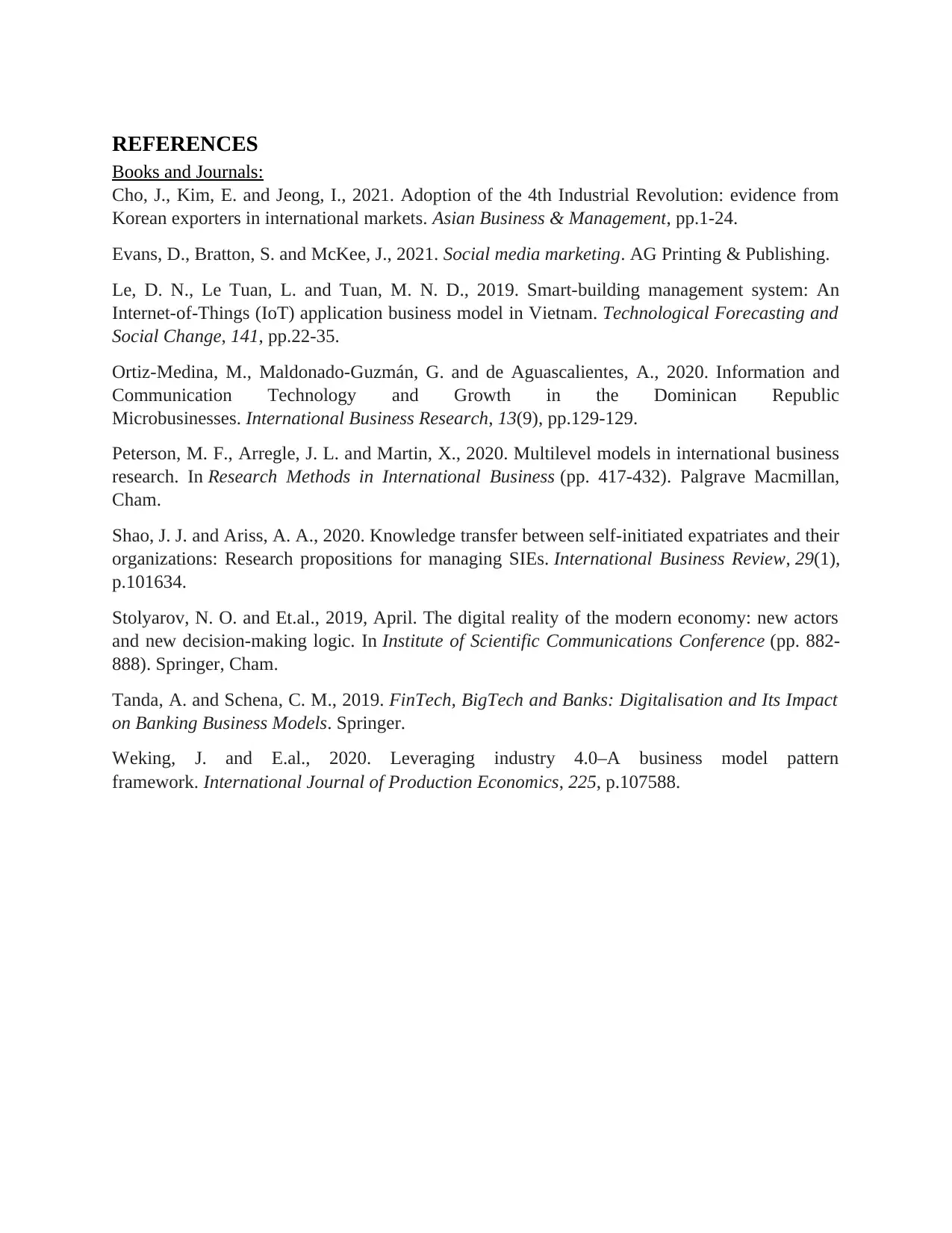
REFERENCES
Books and Journals:
Cho, J., Kim, E. and Jeong, I., 2021. Adoption of the 4th Industrial Revolution: evidence from
Korean exporters in international markets. Asian Business & Management, pp.1-24.
Evans, D., Bratton, S. and McKee, J., 2021. Social media marketing. AG Printing & Publishing.
Le, D. N., Le Tuan, L. and Tuan, M. N. D., 2019. Smart-building management system: An
Internet-of-Things (IoT) application business model in Vietnam. Technological Forecasting and
Social Change, 141, pp.22-35.
Ortiz-Medina, M., Maldonado-Guzmán, G. and de Aguascalientes, A., 2020. Information and
Communication Technology and Growth in the Dominican Republic
Microbusinesses. International Business Research, 13(9), pp.129-129.
Peterson, M. F., Arregle, J. L. and Martin, X., 2020. Multilevel models in international business
research. In Research Methods in International Business (pp. 417-432). Palgrave Macmillan,
Cham.
Shao, J. J. and Ariss, A. A., 2020. Knowledge transfer between self-initiated expatriates and their
organizations: Research propositions for managing SIEs. International Business Review, 29(1),
p.101634.
Stolyarov, N. O. and Et.al., 2019, April. The digital reality of the modern economy: new actors
and new decision-making logic. In Institute of Scientific Communications Conference (pp. 882-
888). Springer, Cham.
Tanda, A. and Schena, C. M., 2019. FinTech, BigTech and Banks: Digitalisation and Its Impact
on Banking Business Models. Springer.
Weking, J. and E.al., 2020. Leveraging industry 4.0–A business model pattern
framework. International Journal of Production Economics, 225, p.107588.
Books and Journals:
Cho, J., Kim, E. and Jeong, I., 2021. Adoption of the 4th Industrial Revolution: evidence from
Korean exporters in international markets. Asian Business & Management, pp.1-24.
Evans, D., Bratton, S. and McKee, J., 2021. Social media marketing. AG Printing & Publishing.
Le, D. N., Le Tuan, L. and Tuan, M. N. D., 2019. Smart-building management system: An
Internet-of-Things (IoT) application business model in Vietnam. Technological Forecasting and
Social Change, 141, pp.22-35.
Ortiz-Medina, M., Maldonado-Guzmán, G. and de Aguascalientes, A., 2020. Information and
Communication Technology and Growth in the Dominican Republic
Microbusinesses. International Business Research, 13(9), pp.129-129.
Peterson, M. F., Arregle, J. L. and Martin, X., 2020. Multilevel models in international business
research. In Research Methods in International Business (pp. 417-432). Palgrave Macmillan,
Cham.
Shao, J. J. and Ariss, A. A., 2020. Knowledge transfer between self-initiated expatriates and their
organizations: Research propositions for managing SIEs. International Business Review, 29(1),
p.101634.
Stolyarov, N. O. and Et.al., 2019, April. The digital reality of the modern economy: new actors
and new decision-making logic. In Institute of Scientific Communications Conference (pp. 882-
888). Springer, Cham.
Tanda, A. and Schena, C. M., 2019. FinTech, BigTech and Banks: Digitalisation and Its Impact
on Banking Business Models. Springer.
Weking, J. and E.al., 2020. Leveraging industry 4.0–A business model pattern
framework. International Journal of Production Economics, 225, p.107588.
1 out of 7
Related Documents
Your All-in-One AI-Powered Toolkit for Academic Success.
+13062052269
info@desklib.com
Available 24*7 on WhatsApp / Email
![[object Object]](/_next/static/media/star-bottom.7253800d.svg)
Unlock your academic potential
Copyright © 2020–2025 A2Z Services. All Rights Reserved. Developed and managed by ZUCOL.



